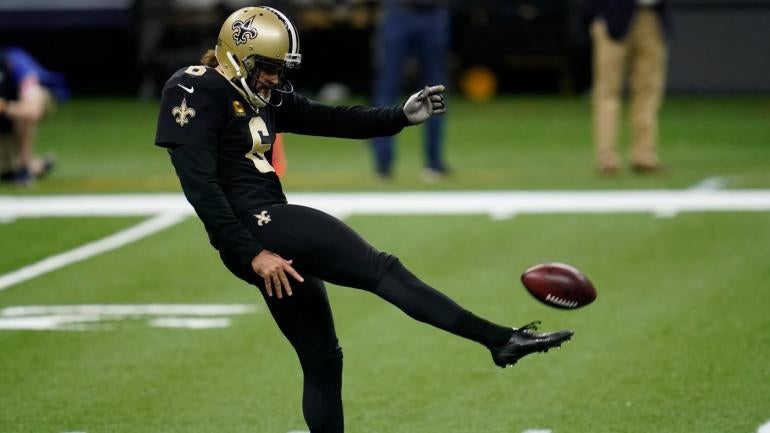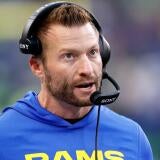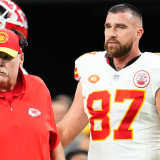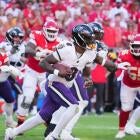Longtime punter Thomas Morstead hopes his remarkable football journey inspires others to pursue their dreams
Morstead's belief in himself has led to a decorated career

If one was to drive past Texas' Pearland High School roughly 20 years ago, there's a good chance they would have seen a teenager punting footballs on an empty practice field. That teenager, Thomas Morstead, has gone on to enjoy a long, highly successful career as an NFL punter that included being an integral part of one of the biggest plays in Super Bowl history.
Not many people, especially Morstead, envisioned that type of success two decades ago. A 5-foot, 90-pound freshman, Morstead quit football after breaking two bones in his leg in his first high school game. He returned to his first love, soccer, but continued to make the short walk from his home to the practice field to kick footballs at his leisure.
"I just didn't feel like I belonged on a football field," Morstead said during a recent interview with CBS Sports. "So I didn't play anymore after that and just focused on soccer."
Obviously, Morstead's story doesn't end there. In fact, that was just the beginning of a fascinating journey, one that actually began several years earlier during a family visit to an English farming village.
Morstead's introduction to 'football'
A product of his era, Morstead grew up during America's soccer boom of the early-to-mid '90s. While football was and continues to grow as America's most popular pastime, it wasn't until Morstead visited the farming village (which was in close proximity to Grimsby) when he first was introduced to American football.
And even then, it wasn't truly football that Morstead was introduced to. His uncle, Charles Salmon, thrust a rugby ball into Morstead's hands for the first time and taught him how to drop kick along with other fundamentals of kicking.
Morstead picked up a liking to it almost immediately. He began challenging himself to kick the ball above the roof of his cousin's home and into the front yard.
"He was the first one who was ever like, 'Here's how you try to punt a spiral,'" Morstead said of his uncle. "Obviously, a rugby ball is rounder then a football. I think it's easier to learn to punt a spiral with a rugby ball. It's something I picked up quickly. People like going to hit golf balls on the driving range. I used to practice going out on my street and practice punting spirals."
Morstead's mother, Isobel, moved to the United States when she was 18. She moved there with her new husband, John Morstead, who was pursuing a career in professional cycling. John Morstead was at the Olympic Festival in 1986, the year the couple gave birth to their son, Thomas.
"He was such a good model," Morstead said of his father, who put together a highly successful cycling career. "I don't really remember him saying much to me as a kid (about competing in sports). I just watched him and the way that he was dedicated with his sport. He wanted to be the best that he could be at it. I think that was something that I was fortunate to have. A model of not talking about it but being about it."
From soccer to football
Despite being one of the leading scorers on his soccer team as a junior, Morstead didn't make the soccer team going into his senior year. Devastated, Morstead's mom recommended he give football a second chance. Son listened to mother, and the result was life-changing.
"They had tried to get me to come out sophomore year and junior year, but I just didn't want to do it," he recalled. "But by then I was 6-foot-4 and went from one of the shortest kids in school to one of the tallest, and had still continued kicking playing soccer.
"They let me be on the team and as the season went on, I kind of took over the starting spot. I had a really fun senior experience. ... I didn't think that I was anything special in high school. I probably averaged 35 or 36 yards per punt. But I remember my coach telling me he'd never seen anyone punt a spiral like me. Even though I wasn't kicking it tremendously far."
Morstead thought his career was over after that, but that quickly started to change after colleges expressed interest in him. Morstead recalls being pulled out of class three times in a single week to meet with college representatives.
Those visits peaked Morstead's interest in playing in college. His high school coach, Tony Heath, also played a significant role in encouraging him to take his talents to the next level.
"My high school coach really thought I had a chance to walk on, especially if I got serious about training and getting stronger," Morstead said. "I had never lifted weights before. Once that became an idea of something I could do, I got pretty serious about it and decided that I was going to try to walk on in college, and that's what I did."
The developmental years
Morstead's mother, a year after recommending that her son give football another chance, also played a big role in the next chapter of her son's football life. With Morstead having already been accepted into SMU's engineering school, Isobel Morstead called Mustangs head coach Phil Bennett on behalf of her son.
Because he was already enrolled at the school, it didn't matter that SMU had already filled each of its walk-on spots. Morstead, his mother explained to the head coach, simply wanted to try out for the team.
"Oh, well, great," Bennett said over the phone. "He can be part of training camp and two-a-days. And once school starts, he can come the first day, and as long as he shows up on time and is here for workouts, we'll have him on our team."
The situation was perfect for the 18-year-old Morstead. While many college freshmen loathe the thought of not playing, Morstead relished the chance to solely work on himself without the pressure of performing on Saturdays.
"I needed that two years of being some guy who nobody knew, but I was training every day and lifting and running with the team," he said. "I think I went to school at 182, and two years later I was 225. I had some major development that needed to happen."
Morstead also heeded the advice of the team's starting punter, Ryan Mentzel, who offered some transparency to his young teammate.
"I was not ready to play. [Mentzel] told me that my freshman year," Morstead said. "He said, 'You're a talented kid. I think you're going to end up being really good, but you're not going to play while I'm here. If I'm you, I'm spending every bit of time developing yourself so that when it is your turn to have that opportunity to win the job, you're ready.' That made sense to me, and I was appreciative for that advice."
Morstead was ready when the opportunity presented itself in 2006. He won the starting job and had the school's highest punting average since Craig James of SMU's "Pony Express" heyday. The season was the first of three consecutive all-conference campaigns for Morstead, who was firmly on the radar of NFL teams by the time he was done at SMU.
Along with becoming arguably college football's best kicker, Morstead developed as an overall person during his time in college.
"I was socially unconfident when I went into college," he said. "Just getting yourself together, disciplining yourself, getting stronger, dedicating yourself to something over a course of years.
"The person that you are at the end of college, not that my values or who I was changed, but how I presented myself and the confidence that I had, I was a totally different person in a very positive way."
Historic rookie season
How good was Morstead coming out of college? So good that the Saints traded up to acquire him in the fifth round of the 2009 NFL Draft. Because of his transformation in college, Morstead felt at home in the Saints' locker room.
"When I came out, I was as confident as you could be, and it didn't feel unwarranted," he said. "I felt like I belonged. Each level, you go up and you're a smaller fish in a much bigger pond. For me, it felt the opposite. In high school I felt like a little pip squeak. In college, I felt like I was finding myself. By the time I got to the end of college, when I got drafted and when I was in the Saints' locker room, I felt like, 'This is where I belong.' It was kind of a backwards series of mentalities from what probably is the norm."
Morstead's confidence came in handy in a big way. After a highly successful season, Morstead and the Saints found themselves matched up against Peyton Manning's Colts in Super Bowl XLIV. Trailing at halftime and looking for a spark, coach Sean Payton called on Morstead to kick the earliestcattempted onside kick in Super Bowl history.
How did the rookie punter feel about Payton's decision?
"When we decided to do it at halftime, I was not excited about it," Morstead recalled. "I sort of had negative thoughts go through my head. Once I realized that it wasn't going away, I kind of had a therapy session with myself. I was thinking of every negative thing possible, just to get it out of my system.
"I was pacing around the locker room. I had this picture up of my old coach. One of the things that he talked about was how championship teams are more confident and more aggressive. I remember thinking to myself, 'Well, this is as about as aggressive as it gets here.' And it relaxed me. It was the first positive thing I thought about. … And then I thought, every time coach had me do it in practice, I hit it just how he wanted. And by the time we went out for halftime, I was feeling very confident about it and was in a good headspace."
Morstead's perfectly-executed kick deflected off a Colts player and into a sea of humanity. After what seemed like an eternity, officials finally determined that Saints safety Chris Reis had recovered the onside kick, giving New Orleans possession. The Saints ultimately took the lead on their ensuing drive and went on to win the franchise's first and only championship.
This week's @DixieBrewCo Legend Spotlight is on Thomas Morstead, who kicked the famous "ambush" onside kick during the 2009 Superbowl! pic.twitter.com/2hAFcoIs7U
— New Orleans Saints (@Saints) December 7, 2019
"One of the benefits of winning a Super Bowl, especially as a young person, it gives you a level of confidence that you previously did not have when it comes to life," Morstead said. "You did something together with a group of men who were all dedicated, all pulling in the same direction. You did something that no one can take it away. It's a lifelong confidence that it gives you.
"It's hard to describe. It's definitely benefitted me throughout the my career to know that in the biggest moments, in the biggest games, you got it done for your team. No matter what you're going through, on or off the field, you have in your mind that you're going to get it done."
The journey continues
Morstead spent 11 more seasons in New Orleans. During that time, he developed into one of the NFL's best punters. He earned a Pro Bowl berth in 2012 and was part of seven playoff teams during the decade. Morstead, who eventually earned the title of special teams captain, was the NFL's highest-paid punter during the decade. Not bad for someone who nearly quit football for good after his first high school game.
Now 36, Morstead is the starting punter for the Miami Dolphins, a team that has legitimate Super Bowl aspirations. Moretead said that the Dolphins, specifically their explosive offense, reminds him of the 2011 Saints team that was led by quarterback Drew Brees, who that season set the then-NFL record for single season passing yards.
"I remember our offense going through stints of time where it was like we couldn't be stopped," he said. "I just remember we went through stints where I didn't punt at all."
A time honored tradition.
— Thomas Morstead (@thomasmorstead) November 13, 2022
ZERO PUNTS!#DolphinsWin #Dolphins #FinsUp #ByeWeek #0punts #Tua #DrewBreesApprovedThisMessage pic.twitter.com/HfdfZUBQck
Morstead's NFL journey has also included personal milestones. He married his wife, Lauren, during his time with the Saints. The couple have four children together.
"The simplest way to put that is I had the best year of my career the year that she went to New Orleans," Morstead said of the impact his wife has had on his career. "I had an inconsistent but good rookie year. My second year I had some significant improvement with consistency. My third year, when she was there, I felt like I kind of had arrived. She was the missing piece."
They always show up! ❤️#Family #Football #FinsUp pic.twitter.com/69SlItkess
— Thomas Morstead (@thomasmorstead) October 16, 2022
Morstead is appreciative of the fact that he plays a significant role on a championship-contending team at this stage of his career. He has no timetable as to when he plans to hang up his cleats for the final time.
"As long as I feel like I can be a value every week to my team," he said, "then I want to keep doing this."
Morstead, who co-authored a children's book about his childhood, hopes that his story can serve as inspiration for anyone who is doubting themselves. By being true to himself, Morstead grew from the high schooler kicking footballs on an empty practice field to one of the most accomplished punters in NFL history. He is hoping that others, regardless of what their passion is, can find similar success and inner satisfaction.
"I took a lot of L's early on, but I was okay to take those L's," he said. "I wasn't worried about how I would be perceived or breaking my self confidence. All I knew is that I didn't want to have regret."
"If you love something, go put the work into it and see how good you can get at it."




















